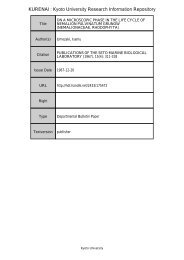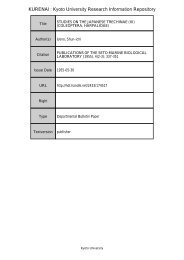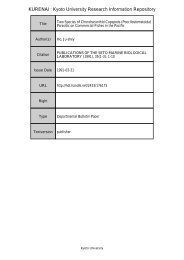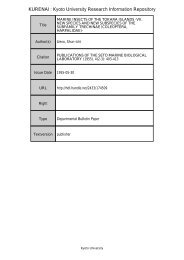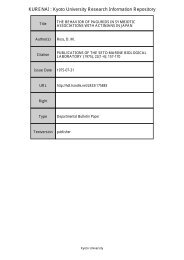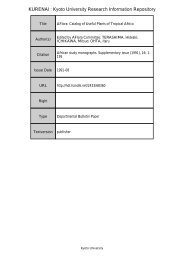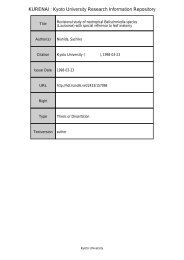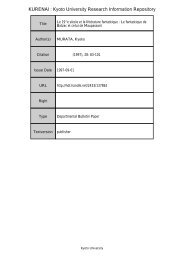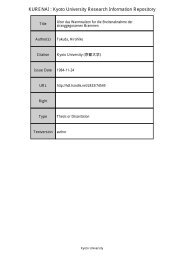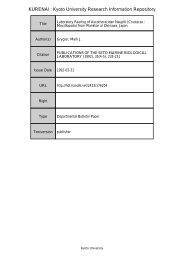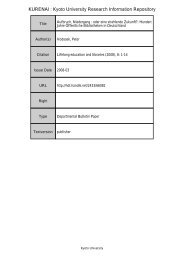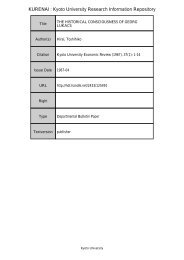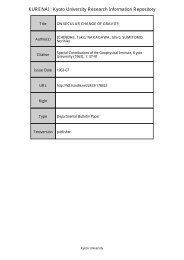Remaindered Life of Citizen-Man, Medium of Democracy
Remaindered Life of Citizen-Man, Medium of Democracy
Remaindered Life of Citizen-Man, Medium of Democracy
Create successful ePaper yourself
Turn your PDF publications into a flip-book with our unique Google optimized e-Paper software.
Southeast Asian Studies, Vol. 49, No. 3, December 2011<br />
<strong>Remaindered</strong> <strong>Life</strong> <strong>of</strong> <strong>Citizen</strong>-<strong>Man</strong>, <strong>Medium</strong> <strong>of</strong> <strong>Democracy</strong><br />
Neferti X. M. TADIAR *<br />
Abstract<br />
The widely-lauded progressive achievements <strong>of</strong> U. S. colonialism in the Philippines during the<br />
early decades <strong>of</strong> the twentieth century included the installation <strong>of</strong> modern technologies <strong>of</strong> public<br />
sanitation, mass transportation, communication and education as necessary conditions <strong>of</strong> a<br />
developing democracy and its underlying humanism. This article discusses how emergent media<br />
<strong>of</strong> communication established under U. S. colonial rule contributed to the implementing <strong>of</strong><br />
universal standards <strong>of</strong> human life and experience towards the formation <strong>of</strong> citizen-man, as the<br />
currency and code required for Filipinosʼ political self-rule. I analyze the reorganization <strong>of</strong><br />
perceptual and subjective forms entailed by U. S. imperial forms <strong>of</strong> governmentality, including the<br />
gender and race effects <strong>of</strong> social accommodations to the protocols <strong>of</strong> personhood <strong>of</strong> citizen-man,<br />
through the media apparatuses <strong>of</strong> literature, photography, and radio. Finally, I examine other<br />
modes <strong>of</strong> sensorial experience and perceptibility and forms <strong>of</strong> human and social life, which are<br />
remaindered, devalued and/or rendered illegible in the reconfiguration <strong>of</strong> natives according to the<br />
normative ideals and structures <strong>of</strong> liberal democracy, in order to expand the parameters <strong>of</strong> our<br />
understanding <strong>of</strong> the relation between social media and democracy.<br />
Keywords: Philippine education, U. S. imperialism, democracy, media technologies, humanization<br />
In the mid-1960s, as a vigorous anti-imperialist nationalist movement gained ground in public<br />
debates over the direction <strong>of</strong> political, economic and cultural life in the Philippines, the historian<br />
Renato Constantino strongly criticized the nationʼs existing educational system and its role in<br />
creating and maintaining the conditions <strong>of</strong> neocolonialism [Constantino 1975]. Constantinoʼs<br />
influential essay, “The Miseducation <strong>of</strong> the Filipino,” argued that, from its inception under U. S.<br />
colonial occupation at the turn <strong>of</strong> the twentieth century, the educational system in the<br />
Philippines was a weapon <strong>of</strong> colonial conquest, an instrument <strong>of</strong> the colonial policy <strong>of</strong><br />
pacification, serving not only to defeat the Filipino nationalism that had just succeeded in<br />
overthrowing the earlier colonial power <strong>of</strong> Spain but also, and more lastingly, to inculcate ideas,<br />
attitudes and values that have kept the Filipino people in a chronic state <strong>of</strong> cultural selfalienation,<br />
political apathy, ideological captivity, and, consequently, in continuing political and<br />
economic subordination to the interests <strong>of</strong> its former colonizer. Constantino identified the<br />
decision to use English as the medium <strong>of</strong> instruction as “the master stroke” in U. S. colonial<br />
educational strategy. As he wrote:<br />
* Department <strong>of</strong> Womenʼs, Gender and Sexuality Studies, Barnard College, Columbia University, NY<br />
10027<br />
e-mail: ntadiar@barnard. edu<br />
464




